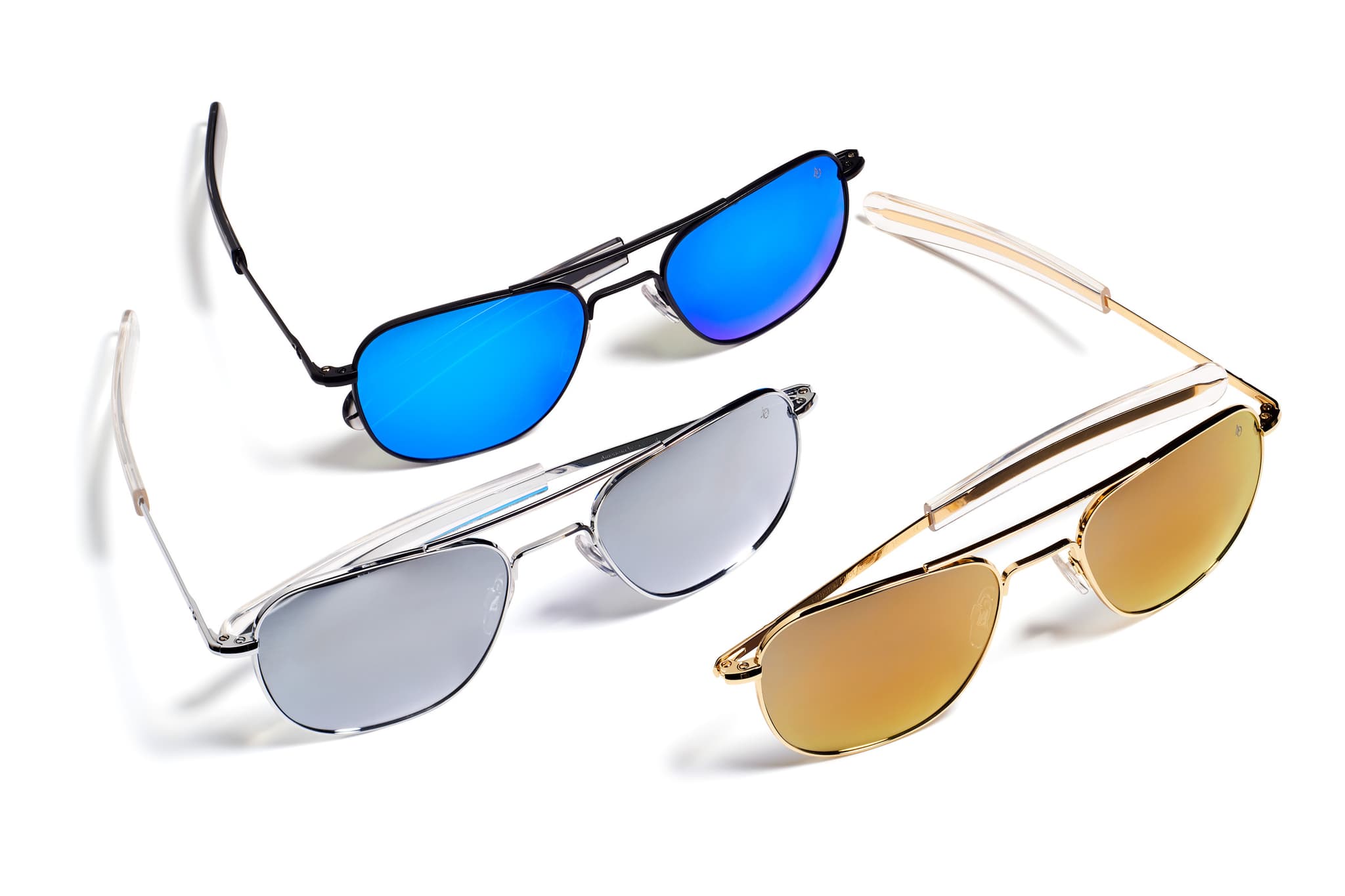
Should You Go Mirrored or Polarized?
Mirrored vs Polarized Sunglasses: What to Choose?
Sunglasses are a must-have accessory for anyone who wants to protect their eyes from the harmful effects of the sun's rays. Two popular types of sunglasses are: mirrored and polarized.
Mirrored sunglasses are known for their reflective surfaces, while polarized sunnies are designed to reduce glare. Both types of sunglasses have their own unique benefits and drawbacks.
In this post, we will compare American Optical mirrored sunglasses and polarized sunglasses to help you make an informed decision on which one (or, spoiler, both!) is right for you.
What Are Mirrored Sunglasses?

Original Pilot with Mirror Lenses
Mirrored sunglasses, also known as mirror shades or reflective sunglasses, are a type of eyewear that features lenses with a reflective coating on the outer surface.
This mirror coating is made of a thin layer of metal that is applied to the lens through a vacuum deposition process. The coating gives the sunglasses a highly reflective appearance, reflects light better than other types of lenses, and reduces the amount of light that passes through the lenses.
Mirrored sunglasses are popular not only for their bold, often colorful, look but also for their ability to provide additional protection against glare and provide UV protection from the sun.
What Are Polarized Sunglasses?

Polarized sunglasses are a type of eyewear that feature lenses designed to reduce harsh glare and improve visual clarity. They have a special filter that blocks horizontal light waves, which are the main cause of glare, while allowing vertical light waves to pass through.
Polarized lenses are particularly useful for outdoor activities such as fishing, boating, and skiing, where glare from water, snow, and other reflective surfaces can be very intense. They are also beneficial for driving, as they can reduce the glare from other vehicles' headlights, improving vision clarity.
Which Is Better: Polarized or Mirrored Sunglasses?
To help you decide which lens type is right for you, we have created a comparison table that highlights the features of both types of sunglasses. The table includes information on their respective benefits, drawbacks, and ideal uses, as well as other important factors such as cost.
Use this table as a guide to help you make an informed decision and find the perfect pair of sunglasses for your needs. (Here's a little secret if you find yourself wanting features from both columns - you can get mirror lenses with polarization!)
| Polarized Lenses | Mirrored Lenses | |
| Glare Reduction | The gold standard for eliminating glare | Reflects more light and glare than standard sun lenses |
| UV Protection | 100% UV protection | 100% UV protection |
| Weather Conditions | Great for bright sunlight, haze, and long wear | Excellent in winter conditions and for overcast days |
| Tint Options | Available on all American Optical lens tints | Available in gold, silver, and blue |
| Scratch Resistance | Hard-coated for scratch resistance | Hard-coated for scratch resistance, but more susceptible to scratching than non-mirrored lenses |
| Comfort | Glare reduction provides all-day visual comfort | Increased light reflection improves visual comfort |
| Recommended Activities | Driving, boating, fishing | Water sports, downhill skiing |
| Cost | $50 lens upgrade | $5 lens upgrade |
Pros and Cons of Mirrored Sunglasses
Let's dive further into the specific pros and cons of wearing mirrored lenses:
Advantages of Mirrored Sunglasses
Mirrored sunglasses offer several advantages that make them a popular choice for many people. Here are some of the benefits of mirrored sunglasses:
- Reduced glare: The reflective coating on the lenses of mirrored sunglasses helps reduce glare from surfaces such as water, snow, and sand, making them ideal for outdoor activities.
- Fashion: The reflective surface of mirrored sunglasses gives them a stylish and trendy appearance that can add an edgy touch to any outfit.
- UV protection: Like other types of sunglasses, mirrored sunglasses provide protection against harmful UV rays from the sun.
- Privacy: The reflective coating on mirrored sunglasses can also provide a degree of privacy by preventing others from seeing your eyes.
- Durability: The reflective coating on mirrored sunglasses also helps protect the lenses from scratches, making them more durable and long-lasting.
Overall, mirrored sunglasses are a great option for those looking for a combination of style and functionality.
Disadvantages of Mirrored Lenses
While mirrored sunglasses have many benefits, there are some disadvantages to consider:
- May not be suitable for all activities: The reflective coating may not be appropriate for certain activities, such as driving at night.
- May attract attention: The reflective surface of mirrored sunglasses may attract unwanted attention in certain situations.
- Limited color options: Mirrored sunglasses are typically only available in a limited range of colors, which may not suit everyone's preferences.
Polarized Sunglasses Pros and Cons
Now let's take a closer look at the advantages and disadvantages of choosing polarized lenses.
Advantages of Polarized Sunglasses
Polarized sunglasses offer several advantages that make them a popular choice for many people. Here are some of the benefits of polarized sunglasses:
- Reduced glare: The special filter in polarized sunglasses helps reduce glare from surfaces such as water, snow, and sand, making them ideal for outdoor activities.
- Improved clarity: By reducing glare, polarized sunglasses can improve visual clarity and enhance color contrast.
- Better eye comfort: Polarized sunglasses can help reduce eye strain and fatigue, making them more comfortable to wear for extended periods.
- UV protection: Like other types of sunglasses, polarized sunglasses provide protection against harmful UV rays from the sun.
Overall, polarized sunglasses are a great option for those looking for better vision and comfort during outdoor activities.
Disadvantages of Polarized Lenses
While polarized sunglasses have many benefits, there are some disadvantages to consider:
- Not suitable for all activities: The polarizing filter may not be appropriate for certain activities, such as viewing LCD screens or digital dashboards. This is especially important for pilots.
- May be more expensive: Polarized sunglasses are often more expensive than non-polarized sunglasses.
Can Mirrored Sunglasses be Polarized?
Yes! After reading through all this, the bottom line is - you don't have to make a tough choice. Opt for mirrored lenses with polarization if you feel the benefits of both lens types are a good fit for your lifestyle.
The mirrored coating is applied to the outside of the lens, while the polarizing filter is applied to the inside. This means that a pair of sunglasses can have both a mirrored finish and a polarizing filter.
Shop the Original Pilot for a pair of sunglasses that combines both technologies for even better glare reduction and visual clarity.

Conclusion
When it comes to choosing the right American Optical sunglasses for your needs, it's important to consider your activities, environment, and personal preferences. Mirrored sunglasses and polarized sunglasses are both great options that offer different benefits and drawbacks.
Mirrored sunglasses provide reduced glare and a stylish look, while polarized sunglasses offer improved visual clarity and eye comfort. Ultimately, the choice between mirrored and polarized sunglasses depends on your specific needs and preferences.
Whether you choose mirrored, polarized, or a combination of both, investing in a quality pair of sunglasses can help protect your eyes and enhance your outdoor experience. Still unsure what to choose? Contact us - we'd love to help!
10% off your first purchase
Join our email list to be first to hear about new arrivals, limited-edition drops, sales, and more! Exclusions apply.







